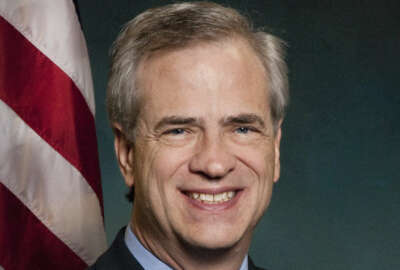
What would happen if President Trump contracted the coronavirus?
When UK's leader was temporarily incapacitated by COVID-19, the government was faced with uncertainty. What if the US ended up in the same situation?
Best listening experience is on Chrome, Firefox or Safari. Subscribe to Federal Drive’s daily audio interviews on Apple Podcasts or PodcastOne.
When UK Prime Minister Boris Johnson was temporarily incapacitated by COVID-19, the rest of the government wasn’t sure what would happen if the worst occurred. What if President Donald Trump ended up in the same situation? The lightning has already stuck as close as the president’s secret service detail. To discuss what would happen, the senior fellow in governance studies at the Brookings Institution, John Hudak, Federal Drive with Tom Temin.
Interview transcript:
Tom Temin: John, good to have you back.
John Hudak: Thanks for having me back Tom.
Tom Temin: So you’ve written extensively what would happen if the President came down with coronavirus, and I guess really what the response would be depended on how serious it is. But generally, what do you feel should or would happen?
John Hudak: Well, I think the first thing that should happen is that the White House should be fairly clear with the American public about what is going on, what the President’s condition is like. If the president were to contract coronavirus, and he was fairly well, he was mildly symptomatic or asymptomatic — he should be the one communicating with the public, visually in particular, not just on Twitter, not just on radio shows, just to demonstrate for the public that the President is well and that the functions of government are continuing.
Tom Temin: And that could be a challenge with this particular presidency, because I think the President wants to project kind of an I guess immunity almost from this whole situation.
John Hudak: Yeah, I think that’s right, and understandably so in some context. The President wants to have this essence of stability, this essence of power, this essence of everything going to be okay in the end. And one way of doing that is this bluster that he has, or at least that’s his perspective, that if he can demonstrate strength and show that he’s well and suggest that he’s immune, then that helps the conversation. But at the same time, I think one of the things that the President is missing here is that empathy goes a long way with the American public. And the idea that this rough and tough approach may be more effective than a calming empathetic approach probably is a little bit off the mark.
Tom Temin: Alright, well be that as it may, there’s a whole staff both of career and political operatives around any president in the White House. What should they all be doing at this point, regardless of whether there’s a positive test of the president?
John Hudak: Well, I think people should be limiting their contact with the president as much as possible, just for the sake of the office and for the sake of continuity of government. Now that’s a difficult thing to ask White House staffers, particularly in a building where your access to the president translates to your power within the institution. And so you’re creating, unfortunately, these two different tensions. One is people inherently want to have access to the President. And two, we’re in a period where limiting access to the president is generally in his health interest and in the broader public health interest.
Tom Temin: Plus the West Wing is kind of a crowded rabbit warren to begin with. If people saw how unglamorous it is inside, they probably wouldn’t want to work there, but they are in very close physical quarters in there.
John Hudak: Yeah I think people fail to appreciate just how small the White House is. I think you look at the building from the outside, and it’s this grand mansion. And I think even shows like The West Wing seem to glamorize how much space is truly in that building, and so you have no choice but to be in close quarters with each other. The real only buffer that exists there is the buffer between staff and the president, which can be artificially kept.
Tom Temin: Sure. And what about, suppose the President did become sick from it, and there’s all degrees of illness from COVID-19, from just a little bit of fever, maybe you don’t feel so great, to out and out incapacitation like we had temporarily with Boris Johnson.
John Hudak: Yeah, the president should meet with both the White House physician but also with experts on this topic if he were to become sick to understand the therapies that he might undergo, and to understand the ability of those therapies to incapacitate him, so to monitor that situation closely. Typically COVID patients have a little bit of a warning between contracting the virus and really starting to go downhill quickly. But in any case, the president should be ready to temporarily turn over the powers of the office to the Vice President under Section 3 of the 25th Amendment, which would be again a temporary transfer if he were unable to fulfill his duties. If the President went downhill quite quickly, on Section 4 could be invoked if he were incapacitated before voluntarily transferring the power.
Tom Temin: And just briefly, what precisely happens under Section 4?
John Hudak: Under Section 4, let’s paint sort of a hypothetical about how this might play out. Let’s say the president, he were to contract COVID, and his condition deteriorated extremely quickly, and he ended up on a ventilator. On a ventilator, you’re going to be sedated and you’re not going to be able to carry out the powers of the presidency.
Tom Temin: Or even to express decisions of your own.
John Hudak: To express decisions of your own, and also questions over his ability then to temporarily transfer the powers is in question as well. So in that situation, the Vice President and a majority of the cabinet can sign a letter to the speaker and to the Senate that says that the President is incapacitated. And once that is received, the powers are transferred over to the Vice President who serves as acting president. And that continues until the president communicates with the Congress that he is well again, and that he is able to take those powers back.
Tom Temin: And then of course in the case of the death of a president that’s pretty cut and dry. And unfortunately, for reasons of assassination, we’ve seen that before.
John Hudak: Yeah, assassination and because of natural death, as well.
Tom Temin: William Henry Harrison, I think lasted a month, right?
John Hudak: Exactly. And what would happen then is of course the Vice President would become President, the Vice Presidency would remained vacant until another provision of the 25th Amendment, Section 2, were to be invoked where the Vice President, the now president, would nominate a new Vice President, and that person would have to be confirmed by both the House and the Senate. Given the amount of time left before the election. I don’t know if we would have a Vice President during that time, but we would certainly have a President.
Tom Temin: Right, I guess a saint could come from heaven and probably couldn’t get confirmed, at least on anything but party lines, with the particular climate we’ve got right now. But with respect to the Vice President taking over temporarily, to what extent is there any history on this? Could the Vice President and the rest of the administration change policy somewhat? Suppose they felt that well we should have a national response that requires masks or something, or some other policy in any area of policy.
John Hudak: So under the 25th Amendment, when the Vice President assumes the powers of the presidency, even as an acting president, he has the powers of the office. So yes, he can change direction of policy, and it’s something that perhaps in a crisis situation would be in an acting president’s interest. That said, when we have examples of people having a sort of placeholder role or taking over powers temporarily, it tends to be a fairly status quo situation, that person does truly serve as a caretaker. So for example, in a lot of American states, if a Governor leaves the state, the Lieutenant Governor holds the powers of the Office for the period until the Governor crosses back over the state line. Typically, Lieutenant Governor’s even in situations where Lieutenant Governor’s come from different parties because they’re elected separately. They are not doing anything outrageous in terms of changing direction, but they are there with the powers just in case something serious were to happen — they have those privileges and duties.
Tom Temin: John Hudak is Senior Fellow in governance studies at the Brookings Institution. Thanks so much for joining me.
John Hudak: Thank you.
Copyright © 2025 Federal News Network. All rights reserved. This website is not intended for users located within the European Economic Area.
Tom Temin is host of the Federal Drive and has been providing insight on federal technology and management issues for more than 30 years.
Follow @tteminWFED




